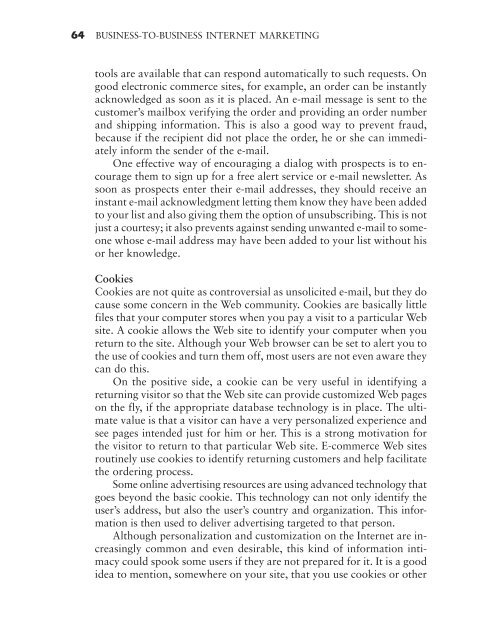- Page 3 and 4:
BUSINESS-TO-BUSINESS INTERNET MARKE
- Page 5 and 6:
BUSINESS-TO-BUSINESS INTERNET MARKE
- Page 7 and 8:
Publisher: Jim Hoskins Manager of F
- Page 9 and 10:
Acknowledgments For helping me crea
- Page 11 and 12:
Table of Contents Table of Contents
- Page 13 and 14:
Table of Contents xi Automated E-ma
- Page 15 and 16:
Table of Contents xiii Real Estate
- Page 17 and 18:
Table of Contents xv Maintaining On
- Page 19 and 20:
Table of Contents xvii Office.com (
- Page 21 and 22:
Table of Contents xix DellHost ....
- Page 23 and 24:
About This Book About This Book xxi
- Page 25 and 26:
Introduction The original edition o
- Page 27:
sively. Large businesses are moving
- Page 30 and 31:
2 BUSINESS-TO-BUSINESS INTERNET MAR
- Page 32 and 33:
4 BUSINESS-TO-BUSINESS INTERNET MAR
- Page 34 and 35:
6 BUSINESS-TO-BUSINESS INTERNET MAR
- Page 36 and 37:
8 BUSINESS-TO-BUSINESS INTERNET MAR
- Page 38 and 39:
10 BUSINESS-TO-BUSINESS INTERNET MA
- Page 40 and 41:
12 BUSINESS-TO-BUSINESS INTERNET MA
- Page 42 and 43: 14 BUSINESS-TO-BUSINESS INTERNET MA
- Page 44 and 45: 16 BUSINESS-TO-BUSINESS INTERNET MA
- Page 46 and 47: 18 BUSINESS-TO-BUSINESS INTERNET MA
- Page 48 and 49: 20 BUSINESS-TO-BUSINESS INTERNET MA
- Page 50 and 51: 22 BUSINESS-TO-BUSINESS INTERNET MA
- Page 52 and 53: 24 BUSINESS-TO-BUSINESS INTERNET MA
- Page 54 and 55: 26 BUSINESS-TO-BUSINESS INTERNET MA
- Page 56 and 57: 28 BUSINESS-TO-BUSINESS INTERNET MA
- Page 58 and 59: 30 BUSINESS-TO-BUSINESS INTERNET MA
- Page 60 and 61: 32 BUSINESS-TO-BUSINESS INTERNET MA
- Page 62 and 63: 34 BUSINESS-TO-BUSINESS INTERNET MA
- Page 64 and 65: 36 BUSINESS-TO-BUSINESS INTERNET MA
- Page 66 and 67: 38 BUSINESS-TO-BUSINESS INTERNET MA
- Page 68 and 69: 40 BUSINESS-TO-BUSINESS INTERNET MA
- Page 70 and 71: 42 BUSINESS-TO-BUSINESS INTERNET MA
- Page 72 and 73: 44 BUSINESS-TO-BUSINESS INTERNET MA
- Page 74 and 75: 46 BUSINESS-TO-BUSINESS INTERNET MA
- Page 76 and 77: 48 BUSINESS-TO-BUSINESS INTERNET MA
- Page 78 and 79: 50 BUSINESS-TO-BUSINESS INTERNET MA
- Page 80 and 81: 52 BUSINESS-TO-BUSINESS INTERNET MA
- Page 82 and 83: 54 BUSINESS-TO-BUSINESS INTERNET MA
- Page 84 and 85: 56 BUSINESS-TO-BUSINESS INTERNET MA
- Page 86 and 87: 58 BUSINESS-TO-BUSINESS INTERNET MA
- Page 88 and 89: 60 BUSINESS-TO-BUSINESS INTERNET MA
- Page 90 and 91: 62 BUSINESS-TO-BUSINESS INTERNET MA
- Page 94 and 95: 66 BUSINESS-TO-BUSINESS INTERNET MA
- Page 96 and 97: 68 BUSINESS-TO-BUSINESS INTERNET MA
- Page 98 and 99: 70 BUSINESS-TO-BUSINESS INTERNET MA
- Page 100 and 101: 72 BUSINESS-TO-BUSINESS INTERNET MA
- Page 102 and 103: 74 BUSINESS-TO-BUSINESS INTERNET MA
- Page 104 and 105: 76 BUSINESS-TO-BUSINESS INTERNET MA
- Page 106 and 107: 78 BUSINESS-TO-BUSINESS INTERNET MA
- Page 108 and 109: 80 BUSINESS-TO-BUSINESS INTERNET MA
- Page 110 and 111: 82 BUSINESS-TO-BUSINESS INTERNET MA
- Page 112 and 113: 84 BUSINESS-TO-BUSINESS INTERNET MA
- Page 114 and 115: 86 BUSINESS-TO-BUSINESS INTERNET MA
- Page 116 and 117: 88 BUSINESS-TO-BUSINESS INTERNET MA
- Page 118 and 119: 90 BUSINESS-TO-BUSINESS INTERNET MA
- Page 120 and 121: 92 BUSINESS-TO-BUSINESS INTERNET MA
- Page 122 and 123: 94 BUSINESS-TO-BUSINESS INTERNET MA
- Page 124 and 125: 96 BUSINESS-TO-BUSINESS INTERNET MA
- Page 126 and 127: 98 BUSINESS-TO-BUSINESS INTERNET MA
- Page 128 and 129: 100 BUSINESS-TO-BUSINESS INTERNET M
- Page 130 and 131: 102 BUSINESS-TO-BUSINESS INTERNET M
- Page 132 and 133: 104 BUSINESS-TO-BUSINESS INTERNET M
- Page 134 and 135: 106 BUSINESS-TO-BUSINESS INTERNET M
- Page 136 and 137: 108 BUSINESS-TO-BUSINESS INTERNET M
- Page 138 and 139: 110 BUSINESS-TO-BUSINESS INTERNET M
- Page 140 and 141: 112 BUSINESS-TO-BUSINESS INTERNET M
- Page 142 and 143:
114 BUSINESS-TO-BUSINESS INTERNET M
- Page 144 and 145:
116 BUSINESS-TO-BUSINESS INTERNET M
- Page 146 and 147:
118 BUSINESS-TO-BUSINESS INTERNET M
- Page 148 and 149:
120 BUSINESS-TO-BUSINESS INTERNET M
- Page 150 and 151:
122 BUSINESS-TO-BUSINESS INTERNET M
- Page 152 and 153:
124 BUSINESS-TO-BUSINESS INTERNET M
- Page 154 and 155:
126 BUSINESS-TO-BUSINESS INTERNET M
- Page 156 and 157:
128 BUSINESS-TO-BUSINESS INTERNET M
- Page 158 and 159:
130 BUSINESS-TO-BUSINESS INTERNET M
- Page 160 and 161:
132 BUSINESS-TO-BUSINESS INTERNET M
- Page 162 and 163:
134 BUSINESS-TO-BUSINESS INTERNET M
- Page 164 and 165:
136 BUSINESS-TO-BUSINESS INTERNET M
- Page 166 and 167:
138 BUSINESS-TO-BUSINESS INTERNET M
- Page 168 and 169:
140 BUSINESS-TO-BUSINESS INTERNET M
- Page 170 and 171:
142 BUSINESS-TO-BUSINESS INTERNET M
- Page 172 and 173:
144 BUSINESS-TO-BUSINESS INTERNET M
- Page 174 and 175:
146 BUSINESS-TO-BUSINESS INTERNET M
- Page 176 and 177:
148 BUSINESS-TO-BUSINESS INTERNET M
- Page 178 and 179:
150 BUSINESS-TO-BUSINESS INTERNET M
- Page 180 and 181:
152 BUSINESS-TO-BUSINESS INTERNET M
- Page 182 and 183:
154 BUSINESS-TO-BUSINESS INTERNET M
- Page 184 and 185:
156 BUSINESS-TO-BUSINESS INTERNET M
- Page 186 and 187:
158 BUSINESS-TO-BUSINESS INTERNET M
- Page 188 and 189:
160 BUSINESS-TO-BUSINESS INTERNET M
- Page 190 and 191:
162 BUSINESS-TO-BUSINESS INTERNET M
- Page 192 and 193:
164 BUSINESS-TO-BUSINESS INTERNET M
- Page 194 and 195:
166 BUSINESS-TO-BUSINESS INTERNET M
- Page 196 and 197:
168 BUSINESS-TO-BUSINESS INTERNET M
- Page 198 and 199:
170 BUSINESS-TO-BUSINESS INTERNET M
- Page 200 and 201:
172 BUSINESS-TO-BUSINESS INTERNET M
- Page 202 and 203:
174 BUSINESS-TO-BUSINESS INTERNET M
- Page 204 and 205:
176 BUSINESS-TO-BUSINESS INTERNET M
- Page 206 and 207:
178 BUSINESS-TO-BUSINESS INTERNET M
- Page 208 and 209:
180 BUSINESS-TO-BUSINESS INTERNET M
- Page 210 and 211:
182 BUSINESS-TO-BUSINESS INTERNET M
- Page 212 and 213:
184 BUSINESS-TO-BUSINESS INTERNET M
- Page 214 and 215:
186 BUSINESS-TO-BUSINESS INTERNET M
- Page 216 and 217:
188 BUSINESS-TO-BUSINESS INTERNET M
- Page 218 and 219:
190 BUSINESS-TO-BUSINESS INTERNET M
- Page 220 and 221:
192 BUSINESS-TO-BUSINESS INTERNET M
- Page 222 and 223:
194 BUSINESS-TO-BUSINESS INTERNET M
- Page 224 and 225:
196 BUSINESS-TO-BUSINESS INTERNET M
- Page 226 and 227:
198 BUSINESS-TO-BUSINESS INTERNET M
- Page 228 and 229:
200 BUSINESS-TO-BUSINESS INTERNET M
- Page 230 and 231:
202 BUSINESS-TO-BUSINESS INTERNET M
- Page 232 and 233:
204 BUSINESS-TO-BUSINESS INTERNET M
- Page 234 and 235:
206 BUSINESS-TO-BUSINESS INTERNET M
- Page 236 and 237:
208 BUSINESS-TO-BUSINESS INTERNET M
- Page 238 and 239:
210 BUSINESS-TO-BUSINESS INTERNET M
- Page 240 and 241:
212 BUSINESS-TO-BUSINESS INTERNET M
- Page 242 and 243:
214 BUSINESS-TO-BUSINESS INTERNET M
- Page 244 and 245:
216 BUSINESS-TO-BUSINESS INTERNET M
- Page 246 and 247:
218 BUSINESS-TO-BUSINESS INTERNET M
- Page 248 and 249:
220 BUSINESS-TO-BUSINESS INTERNET M
- Page 250 and 251:
222 BUSINESS-TO-BUSINESS INTERNET M
- Page 252 and 253:
224 BUSINESS-TO-BUSINESS INTERNET M
- Page 254 and 255:
226 BUSINESS-TO-BUSINESS INTERNET M
- Page 256 and 257:
228 BUSINESS-TO-BUSINESS INTERNET M
- Page 258 and 259:
230 BUSINESS-TO-BUSINESS INTERNET M
- Page 260 and 261:
232 BUSINESS-TO-BUSINESS INTERNET M
- Page 262 and 263:
234 BUSINESS-TO-BUSINESS INTERNET M
- Page 264 and 265:
236 BUSINESS-TO-BUSINESS INTERNET M
- Page 266 and 267:
238 BUSINESS-TO-BUSINESS INTERNET M
- Page 268 and 269:
240 BUSINESS-TO-BUSINESS INTERNET M
- Page 270 and 271:
242 BUSINESS-TO-BUSINESS INTERNET M
- Page 272 and 273:
244 BUSINESS-TO-BUSINESS INTERNET M
- Page 274 and 275:
246 BUSINESS-TO-BUSINESS INTERNET M
- Page 276 and 277:
248 BUSINESS-TO-BUSINESS INTERNET M
- Page 278 and 279:
250 BUSINESS-TO-BUSINESS INTERNET M
- Page 280 and 281:
252 BUSINESS-TO-BUSINESS INTERNET M
- Page 282 and 283:
254 BUSINESS-TO-BUSINESS INTERNET M
- Page 284 and 285:
256 BUSINESS-TO-BUSINESS INTERNET M
- Page 286 and 287:
258 BUSINESS-TO-BUSINESS INTERNET M
- Page 288 and 289:
260 BUSINESS-TO-BUSINESS INTERNET M
- Page 290 and 291:
262 BUSINESS-TO-BUSINESS INTERNET M
- Page 292 and 293:
264 BUSINESS-TO-BUSINESS INTERNET M
- Page 294 and 295:
266 BUSINESS-TO-BUSINESS INTERNET M
- Page 296 and 297:
268 BUSINESS-TO-BUSINESS INTERNET M
- Page 298 and 299:
270 BUSINESS-TO-BUSINESS INTERNET M
- Page 300 and 301:
272 BUSINESS-TO-BUSINESS INTERNET M
- Page 302 and 303:
274 BUSINESS-TO-BUSINESS INTERNET M
- Page 304 and 305:
276 BUSINESS-TO-BUSINESS INTERNET M
- Page 306 and 307:
278 BUSINESS-TO-BUSINESS INTERNET M
- Page 308 and 309:
280 BUSINESS-TO-BUSINESS INTERNET M
- Page 310 and 311:
282 BUSINESS-TO-BUSINESS INTERNET M
- Page 312 and 313:
284 BUSINESS-TO-BUSINESS INTERNET M
- Page 314 and 315:
286 BUSINESS-TO-BUSINESS INTERNET M
- Page 316 and 317:
288 BUSINESS-TO-BUSINESS INTERNET M
- Page 318 and 319:
290 BUSINESS-TO-BUSINESS INTERNET M
- Page 320 and 321:
292 BUSINESS-TO-BUSINESS INTERNET M
- Page 322 and 323:
294 BUSINESS-TO-BUSINESS INTERNET M
- Page 324 and 325:
296 BUSINESS-TO-BUSINESS INTERNET M
- Page 326 and 327:
298 BUSINESS-TO-BUSINESS INTERNET M
- Page 328 and 329:
300 BUSINESS-TO-BUSINESS INTERNET M
- Page 330 and 331:
302 BUSINESS-TO-BUSINESS INTERNET M
- Page 332 and 333:
304 BUSINESS-TO-BUSINESS INTERNET M
- Page 334 and 335:
306 BUSINESS-TO-BUSINESS INTERNET M
- Page 336 and 337:
308 BUSINESS-TO-BUSINESS INTERNET M
- Page 338 and 339:
310 BUSINESS-TO-BUSINESS INTERNET M
- Page 340 and 341:
312 BUSINESS-TO-BUSINESS INTERNET M
- Page 342 and 343:
314 BUSINESS-TO-BUSINESS INTERNET M
- Page 344 and 345:
316 BUSINESS-TO-BUSINESS INTERNET M
- Page 346 and 347:
318 BUSINESS-TO-BUSINESS INTERNET M
- Page 348 and 349:
320 BUSINESS-TO-BUSINESS INTERNET M
- Page 350 and 351:
322 BUSINESS-TO-BUSINESS INTERNET M
- Page 352 and 353:
324 BUSINESS-TO-BUSINESS INTERNET M
- Page 354 and 355:
326 BUSINESS-TO-BUSINESS INTERNET M
- Page 356 and 357:
328 BUSINESS-TO-BUSINESS INTERNET M
- Page 358 and 359:
330 BUSINESS-TO-BUSINESS INTERNET M
- Page 360 and 361:
332 BUSINESS-TO-BUSINESS INTERNET M
- Page 362 and 363:
334 BUSINESS-TO-BUSINESS INTERNET M
- Page 364 and 365:
336 BUSINESS-TO-BUSINESS INTERNET M
- Page 366 and 367:
338 BUSINESS-TO-BUSINESS INTERNET M
- Page 368 and 369:
340 BUSINESS-TO-BUSINESS INTERNET M
- Page 370 and 371:
342 BUSINESS-TO-BUSINESS INTERNET M
- Page 372 and 373:
344 BUSINESS-TO-BUSINESS INTERNET M
- Page 374 and 375:
346 BUSINESS-TO-BUSINESS INTERNET M
- Page 376 and 377:
348 BUSINESS-TO-BUSINESS INTERNET M
- Page 378 and 379:
350 BUSINESS-TO-BUSINESS INTERNET M
- Page 380 and 381:
352 BUSINESS-TO-BUSINESS INTERNET M
- Page 382 and 383:
354 BUSINESS-TO-BUSINESS INTERNET M
- Page 384 and 385:
356 BUSINESS-TO-BUSINESS INTERNET M
- Page 386 and 387:
358 BUSINESS-TO-BUSINESS INTERNET M
- Page 388 and 389:
360 BUSINESS-TO-BUSINESS INTERNET M
- Page 390 and 391:
362 BUSINESS-TO-BUSINESS INTERNET M
- Page 392 and 393:
364 BUSINESS-TO-BUSINESS INTERNET M
- Page 394 and 395:
366 BUSINESS-TO-BUSINESS INTERNET M
- Page 396 and 397:
368 BUSINESS-TO-BUSINESS INTERNET M
- Page 398 and 399:
370 BUSINESS-TO-BUSINESS INTERNET M
- Page 400 and 401:
372 BUSINESS-TO-BUSINESS INTERNET M
- Page 402 and 403:
374 BUSINESS-TO-BUSINESS INTERNET M
- Page 404 and 405:
376 BUSINESS-TO-BUSINESS INTERNET M
- Page 406 and 407:
378 BUSINESS-TO-BUSINESS INTERNET M
- Page 408 and 409:
380 BUSINESS-TO-BUSINESS INTERNET M
- Page 410 and 411:
382 BUSINESS-TO-BUSINESS INTERNET M
- Page 412 and 413:
384 BUSINESS-TO-BUSINESS INTERNET M
- Page 414 and 415:
386 BUSINESS-TO-BUSINESS INTERNET M
- Page 416 and 417:
388 BUSINESS-TO-BUSINESS INTERNET M
- Page 418 and 419:
390 BUSINESS-TO-BUSINESS INTERNET M
- Page 420 and 421:
392 BUSINESS-TO-BUSINESS INTERNET M
- Page 422 and 423:
394 BUSINESS-TO-BUSINESS INTERNET M
- Page 424 and 425:
396 BUSINESS-TO-BUSINESS INTERNET M
- Page 426 and 427:
398 BUSINESS-TO-BUSINESS INTERNET M
- Page 428 and 429:
400 BUSINESS-TO-BUSINESS INTERNET M
- Page 430 and 431:
402 BUSINESS-TO-BUSINESS INTERNET M
- Page 432 and 433:
101 Ways to Promote Your Web Site,










